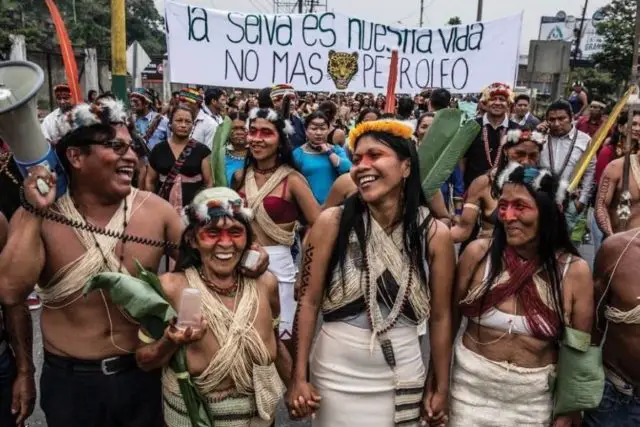A court in the Ecuadorian province of Pastaza, in the eastern part of the country, on Friday issued a historic ruling in favor of the Waorani indigenous ethnicity, which demanded a halt to the bidding of an oil field in its territory because a full consultation has not been carried out, as required by law.
The indigenous ethnic group had asked the court for an action of protection against oil exploitation in the so-called block 22, in bidding by the Ministry of Energy and Hydrocarbons. “This court determines that there is a violation of the constitutional right to prior, free and informed consultation, which is why it accepts the protection action for communities belonging to the Waorani nationality of Pastaza”, was the sentence of Judge Pilar Araujo, according to a communiqué from the Waorani action group.
The ethnic group claimed that a consultation carried out years ago in that region was “vitiated”, “tricky”, and that it did not guarantee the principle of information and freedom of consultation because it was a “deception of communities to justify the oil bidding in the territory”.

The judge thus recognized the violation of the right to prior consultation and, consequently, the Ministry must carry out that consultation before bidding for the field. The legal battle of the Waoranis was joined by US actor Leonardo DiCaprio, who today, in a message on social networks, congratulated them on their victory. “The Waorani people have won a legal victory to protect the rainforests from oil drilling and have set a historic precedent for indigenous rights”, indicated the actor.
“It is a triumph for all the indigenous peoples of Ecuador and the world. This is a victory for the Waorani, Shuar, Achuar, Kichwas, Shiwiar, Sapara, Andwa and all the communities of the south-central Amazon in defense of their territory”, agrees a statement from the Waorani Resistance group.
The group, as well as other indigenous people who are part of the population of Ecuador, considered that this is a resolution that represents a “victory for the Amazon” because it will protect some 200,000 hectares of the
According to a document from the Ombudsman’s Office, which was an integral part of the petition against the Ministry of Energy and Hydrocarbons, the prior consultation in Ecuador is based on Article 6 of Convention 169 of the International Labor Organization.
It states that “Governments shall consult the peoples through appropriate procedures with respect to legislative and administrative measures likely to affect them, as well as to participate freely by appropriate means and under the principle of good faith.
It is also contained in the Constitution of the country and its different laws through rules and regulations. “Through the process of prior consultation, the aim is to guarantee the protection of their cultural, social and economic integrity”, emphasizes the Ombudsman’s Office document.
Indigenous peoples oppose oil and mining exploitation because they consider it a threat to their way of life, their traditions, and the Mother Earth. Ecuador’s main oilfields are located in the Amazon, precisely where a large number of indigenous tribes are concentrated.
According to a Twitter message from Waorani Resistance, in 2011 the oil blocks in the Ecuadorian Amazon covered 76% of the total surface area of territories of 7 indigenous nationalities and affected the mobility of isolated collectives like Tagaeri and Taromenane.

